Senduduk
INTRODUCTION
Melastomataceae plants originate in the tropic and subtropic regions, with a total of more than 4,000 species in the world. In the Southeast Asian region alone, the genus Melastoma comprises 22 species. Malaysia, particularly, with a tropical climate, is home to at least 12 species, many of which are used by natives in folk medicine. In general, M. malabathricum is a small shrub commonly found in previously cleared land, waste places, and roadside throughout the Southeast Asian countries, including Malaysia.
PLANT DESCRIPTION
Senduduk is an erect much branched shrub growing to a height of 3 m. The leaves are simple, entire, lanceolate in shape and can grow up to a length of 7 cm. The leaves are green, rough texture, covered with minute hairs. The flowers are large and showy, measuring 5-7 cm across.
PLANT HABIT
This plant is propagated easily through seeds. The seeds are sown in the nursery and after 2 weeks the seedlings can seen sprouting out. The plants are transfered to the field when they reach about 6 weeks old. It can adapt itself to most soil conditions and thrives in full sunlight. The planting distance can be kept about 2mx2m apart. Harvesting of the vegetative part is normally done after a period of 6 months.
PLANT PARTS USED
Leaves, shoots and roots.
USES IN TRADITIONAL MEDICINE
The leaves and shoots are traditionally eaten to cure diarrhea. In Malaysia, paste made from senduduk leaves and roots are used to prevent scars from scurf or smallpox. A decoction of the roots is used to relieve toothaches, to soften the feet and to eliminate flatulence. A decoction of the roots and leaves or roots alone is taken by women after childbirth. A decoction prepared from a mixture of senduduk leaves, vinegar, Zingiber officinale and Zingiber cassumnar (bonglai) is used for treating leucorrhea. The leaves and shoot ends alone or with mangosteen bark or fruit husks are prepared as decoction for treating diarrhea. The powdered leaves are used for treating dysentry, wounds and as tonic.







